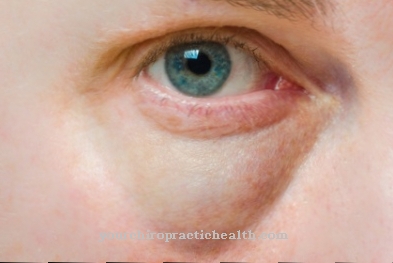Headache is a common condition that can become chronic. The causes for this are manifold and require clarification by a doctor. On average, women are more likely to chronic headache affected than men.
What are persistent headaches?

The doctor speaks of constant headache in the case of migraines or continuous headache. 2-5% of the population suffer from chronic headaches. By definition, this is the case if the symptoms occur on average more than 15 days a month and have been for at least 3 months.
Several million people in Germany suffer from persistent headaches. The symptoms can be very different. The pain usually occurs on both sides in the temple area, is diffuse and cannot be clearly localized. The person affected can perceive them as stinging, throbbing, pressing or pulsing. In some cases, chronic headaches are accompanied by side effects. These include sensitivity to noise and light, impaired vision and poor concentration. It can also lead to circulatory problems.
Often the symptoms start when you wake up and last throughout the day. This severely restricts the sufferer's everyday life and can become a great burden. As a rule, medication is therefore the first choice.
causes
However, many sufferers are not aware of the risks of taking pain medication. Common pain relievers such as aspirin, paracetamol or ibuprofen contain analgesics and triptans, which in turn can lead to pain in high doses. Around 8% of those suffering from constant headache tend to overdose on medication. In doing so, they start a vicious circle.
The pain occurs and the sufferer takes pain relievers, which make the symptoms worse. The doctor speaks of a drug-induced headache, which occurs in around 1-2% of those affected.
Another cause of chronic headache is genetics. A genetic disposition can play a role in persistent headaches. This also means that chronic headaches can build up within the family. Stress and constant tension in everyday life are also risk factors and can make the problem worse. In many cases, however, the cause of the condition is not known. It is therefore difficult for the doctor to make a reliable diagnosis and treat the pain.
You can find your medication here
➔ Medicines for headaches and migrainesDiseases with this symptom
- Meningitis
- alcoholism
- migraine
- concussion
- Eye migraines
- bronchial asthma
- Corneal inflammation
- Brain tumor
- Glutamate intolerance
- Chronic sinusitis
- high blood pressure
- Tension headache
Diagnosis & course of disease
If it is a drug-induced headache, it is hardly possible to end the cycle without medical help. The ignorance of those affected is a problem here and can only be dealt with through education and with the right steps. In addition, it is difficult to distinguish persistent headaches from post-traumatic headaches.
A reliable diagnosis is often only possible during therapy. In any case, a doctor should be consulted if the symptoms appear. If the doctor can rule out other diseases, he will make an initial diagnosis of exclusion.
A distinction must also be made between different forms of persistent headache. For example, migraines are treated differently from chronic tension headaches. At best, the symptoms can not only be alleviated with appropriate therapeutic measures, but also disappear completely. The course of the disease is significantly influenced by the type of headache and the therapy.
When should you go to the doctor?
Migraines or tension headaches are the most common forms of persistent headache. Persistent headaches are usually so uncomfortable that they always lead those affected to the doctor. But 95% of headaches are harmless.
Only in 5% the pain is a symptom of a serious illness. There are many causes of persistent headaches. They are often caused by tension in the cervical spine. In this case, pain medication can exacerbate the problem. It is much more important to release the tension. Sometimes constant headaches have a very simple cause, namely the wrong pillow. So it is understandable that the doctor cannot always find out the reason for the pain.
Sometimes common sense helps identify the problem. Even if most headache patients are afraid of it, only 0.1% of all cases are caused by a tumor. In the case of chronic headaches, a visit to the doctor is still advisable. If headaches appear as a new phenomenon and every day, a visit to the doctor is advisable. It is just as important for headaches combined with neurological deficits.
Unilateral headaches that last for weeks can arise, for example, from changes in blood vessels. Inflammation in the jaw area can also be the reason. Various treatment concepts are possible for migraines. Relaxation often helps. If necessary, a pain clinic is the right place to go.
Doctors & therapists in your area
Treatment & Therapy
So far there have been a few therapeutic approaches to treat the symptoms. A different therapy is required here than for episodic pain. While pain pills are the first remedy of choice for severe, occasional ailments, usual medication should be avoided for persistent headache for the reasons mentioned above.
However, the therapeutic successes are difficult to reproduce and not uniform. Usually, the doctor will resort to drugs such as amitriptyline for chronic headaches. These are antidepressants that work in about half of the cases. A placebo rate of 25% can be assumed. Another possibility is the administration of muscle relaxants. Doctors often recommend a combination therapy that consists of several different active ingredients and usually achieves better results.
Doctors use botulinum toxin against migraines, for example. With tension headache, however, hardly any successes can be recorded here. It is used in migraine sufferers over a period of several weeks. Botulinum toxin is given through injections into the head area. Improvement is usually seen after around 8 weeks of treatment.
In addition, the question of lifestyle habits makes sense for any type of persistent headache. Stress management and relaxation training can improve the symptoms sustainably. Movement also has a positive effect on general well-being. If the symptoms are due to increased use of analgesics and triptans, withdrawal treatment is advisable. ASA, paracetamol or ibuprofen are stopped and the body is weaned. It is now common to administer preventive medication at the same time in order to keep the symptoms as low as possible during withdrawal.
Outlook & forecast
It is extremely difficult to make a prospect or prognosis with regard to permanent headaches, as there is usually an underlying disease for this clinical picture. In many cases, persistent headaches are caused by excessive use of painkillers. This creates permanent pain, which severely restricts the person affected in his or her everyday life. It can lead to immense concentration disorders, which in turn lead to significant problems in life.
This type of headache can come in many different forms and types. You can make yourself noticeable by a constant throbbing in the head, or by a stinging stinging. If you continue taking the pain medication, you definitely cannot expect any improvement. Noticeable improvement can only be expected when the painkillers are completely stopped.
However, there can still be various side effects. These include fever or chills. It is very difficult to give an exact prognosis regarding permanent headaches, since the cause can be very diverse and different. In many cases, in addition to pain relievers, stress is also the reason why headaches last for several days or weeks.
You can find your medication here
➔ Medicines for headaches and migrainesprevention
Preventing the recurrence of chronic headaches is only possible if the cause of the previous pain is known. This is usually a lengthy process in which the previous history and also psychological factors can play a role. In some cases, the reasons for the complaints can be identified by excluding other diseases.
Preventive measures are difficult to implement and cannot be generalized due to various possibilities. If the headache has not yet occurred, it is advisable to take pain pills with extreme caution and only in small doses. If the pain is bearable without tablets, they should be completely avoided. In this way, a drug-induced constant headache can be prevented.
You can do that yourself
Simple self-help strategies are often enough to relieve persistent headaches. For permanent tension headaches, it can be helpful to dab the forehead, temples and neck with diluted mint oil. The oil relaxes and cools. A damp washcloth on the forehead provides additional cooling. Mint oil is available in the pharmacy.
People with persistent headaches should eat regular and healthy meals. Fruit, fruit bars or fruit pulp are ideal for on the go. Foods with a lot of magnesium, such as fish, whole grain products and legumes, are also recommended. Those affected should also drink enough fluids, at least 1.5 to 2 liters a day.
A cup of espresso with lemon can also help with persistent headaches. Caffeine slightly narrows the blood vessels in the brain that the headache causes. The vitamin C of the lemon stimulates the formation of an endogenous messenger substance that reduces pain. Loose exercise can reduce persistent headaches. We recommend light jogging and hiking (or long walks). Three training units per week, each lasting 30 minutes, are useful.
Relaxation methods such as autogenic training, yoga and progressive muscle relaxation often help against persistent headaches. Everyday hectic rush can be dealt with better and permanent headaches can be reduced. A regular sleep-wake rhythm can relieve persistent headaches. It makes sense to go to bed on time and always at the same time.












.jpg)



.jpg)










.jpg)
